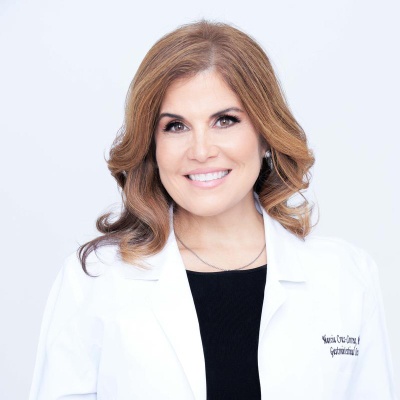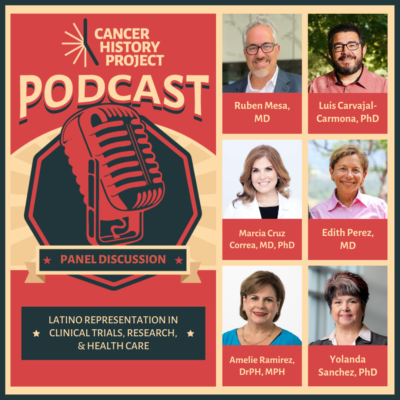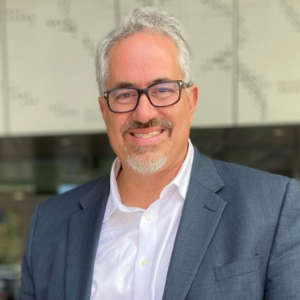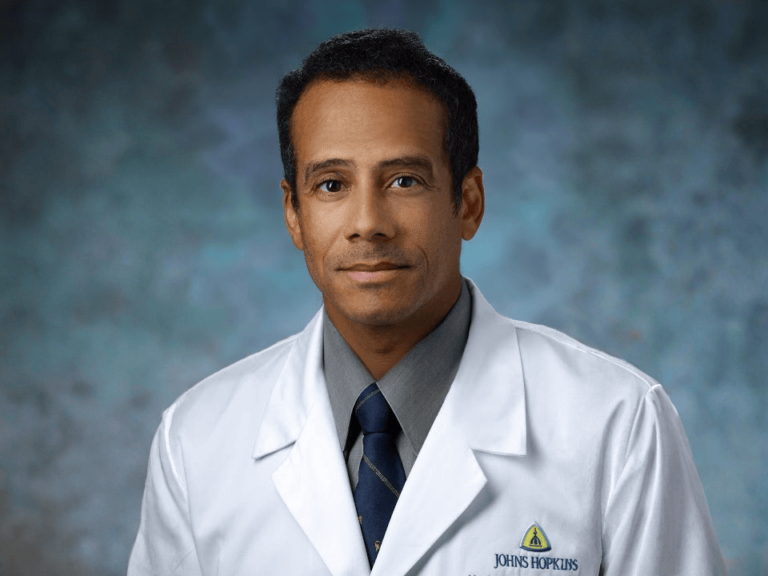Hispanic and Latino people comprise nearly 20% of the U.S. population, but less than 6% of physicians nationwide identify as Hispanic.
“The pipeline issue continues to be a huge issue for us,” Amelie Ramirez, of UT Health San Antonio and Mays Cancer Center, said during a panel discussion convened by The Cancer Letter to mark Hispanic Heritage Month. “As our population continues to grow, in terms of the Latino population, we definitely need more [Latino physicians].”
Ramirez joined five other cancer experts for a conversation about cancer in Latinos, health equity, and how to support Latino clinicians and researchers. The discussion was moderated by Ruben Mesa.
Mesa agreed to serve as The Cancer Letter’s guest editor for Hispanic Heritage Month.
Panel participants included:


Luis Carvajal-Carmona, PhD
Professor, Auburn Community Cancer Endowed Chair in Basic Science,
Associate vice chancellor for the Office of Academic Diversity, University of California, Davis


Marcia Cruz-Correa, MD, PhD
Lead investigator and director, Clinical & Translational Research, University of Puerto Rico Comprehensive Cancer Center;
Chief medical officer, PanOncology Trials;
Professor of medicine and biochemistry, University of Puerto Rico School of Medicine


Edith Perez, MD
Professor emeritus,
Mayo Clinic


Amelie Ramirez, DrPH, MPH
Professor,
Director, Institute for Health Promotion Research,
Chair, Department of Population Health Sciences, UT Health San Antonio;
Associate director of cancer outreach and engagement, Mays Cancer Center


Yolanda Sanchez, PhD
Director and CEO,
University of New Mexico Comprehensive Cancer Center
This conversation between all six cancer experts is available on the Cancer History Project podcast.
Since trust plays a huge role in recruiting participants, the dearth of Latinos in health care affects clinical trials and translational research, said Cruz-Correa, of the University of Puerto Rico and PanOncology Trials. “For our patients, for our communities, language is still important—that concordance between the physician that is telling you about the study and the patient’s background.
“Studies have shown that Latino patients want to have, if possible, someone that comes from a Latino background. But that’s one of the biggest barriers,” Cruz-Correa said.
Still, it’s important to remember that Latinos are a very diverse group, said Carvajal-Carmona, of UC Davis. “Here in the Central Valley of California, where Davis is, a lot of the migrant farm workers—one in 10 of them—speak a language that is not Spanish.”
A lot of them speak languages from Oaxaca. They speak Mixteco, Zapoteco, Triqui; right? So, if you think about cancer disparities in Latinos, the disparities in these Indigenous groups are even higher,” he said.
Latino people of the myriad ethnicities throughout the Americas have a variety of histories, cultures, and cancer risk factors, Carvajal-Carmona said.
Only about 10% of NCI-funded clinical trial participants and about 4% of FDA-run drug trial participants identify as Hispanic or Latino (The Cancer Letter, June 26, 2020).
“Our community really doesn’t talk about cancer. They still are fearful of being diagnosed with cancer, so they don’t share that information with many individuals,” Ramirez said. “What I learned is that we really need to do prior education. Our community feels at clinical trials that they’re being tested as guinea pigs.”
Ramirez and her colleagues have been providing that education through community-based listening sessions and videos that explain how clinical trials work, as well as by distributing cancer prevention and other health information nationwide through Salud America!.
“It’s getting them ready to at least hear the terms, understand what those terms mean, so that when they meet with the provider, they at least have some knowledge about what is a clinical trial, what does randomization mean, and for them to be able to come up with their own questions that they would like to ask the clinician,” Ramirez said.
The pipeline issue continues to be a huge issue for us. As our population continues to grow, in terms of the Latino population, we definitely need more [Latino physicians].
Amelie Ramirez
Creating that strong foundation is crucial, agreed Yolanda Sanchez, of the University of New Mexico Comprehensive Cancer Center. “When we approach patients for this representation, and we try to increase, we have to start with trust, and we have to build the trust. We can’t just launch into ‘give me your data, and let’s create a specimen.’”
Latinos working as oncology professionals need that level of care and support, too, said Sanchez, who is the first Latina director of an NCI-designated cancer center. The day before her new role was announced, Sanchez said she received a flood of emails from fellow directors from underrepresented groups offering their cell phone numbers and telling her to reach out whenever she needed help.
“That is how we create the leaders of tomorrow,” Sanchez said. “We show up for them. We are there as their sponsors. We don’t just nominate them for roles, but we also follow through with the support that they need.”
For instance, UNM’s cancer center has an emerging leaders program to uplift and coach younger faculty members who have the potential for leadership roles. “What is very important to note is that this cannot be a minority tax on our young members,” Sanchez said.
She and her colleagues remain mindful of the participants’ time commitments and help them distribute their tasks so that they do not become overburdened.
“This is very important, because what we want to do is we want to develop the leaders that are going to find joy in leading at our cancer center and at other institutions—and also not burn them out,” Sanchez said.
Regardless of career stage, it’s vital to continue to make Latinos’ professional presence in oncology known, especially through participation in organizations such as the American Society of Clinical Oncology and the American Association for Cancer Research, said Perez, of Mayo Clinic.
Cover Illustration: Jessica Paniagua/Jessartlet Illustrations














